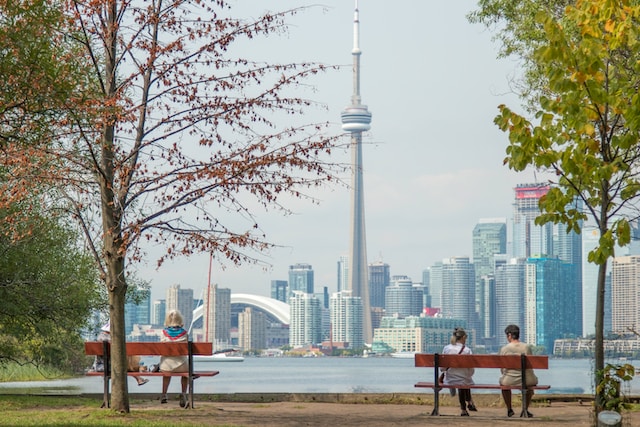Deputy Mayor Jennifer McKelvie (Scarborough-Rouge Park) and Toronto City Councillor Dianne Saxe (University-Rosedale) have announced that 100 per cent of short-term actions in support of the City of Toronto’s ambitious net zero emission targets are now underway, with some complete. The update is one of the key findings within two City reports on progress in implementing the ambitious TransformTO Net Zero Climate Action Strategy: the 2022 Annual Update and the Carbon Accountability Report.
Both reports, which come as Toronto recognizes Earth Month, will be considered by the Infrastructure and Environment Committee at its meeting on Wednesday, April 26 and by Toronto City Council at its May meeting.
The City’s TransformTO Net Zero Strategy, adopted by Council in December 2021, established accelerated implementation actions to reduce greenhouse (GHG) emissions, particularly in the short term, and set one of the most ambitious targets in North America – to reduce community-wide emissions to net zero by 2040. Leading by example, the City plans to cut GHG emissions from its own operations even faster.
The 2022 Annual Update report outlines the City’s progress in implementing the TransformTO Strategy’s Short-term Implementation Plan (2022 to 2025) and provides an update on the five critical steps the City is taking to steer community-wide emissions towards net zero:
- establish carbon accountability and show this accountability through carbon budgeting
- rapidly reduce significant fossil gas use
- establish building performance standards
- increase the use and adoption of low-carbon transportation options
- increase the amount of local renewable energy and storage opportunities
Through the 30 actions in the City’s Short-term Implementation Plan and ongoing delivery of programs, policies, and investments, the City continues to lay the foundation for wide-spread community action to reduce GHG emissions, now and in the future.
Key achievements in 2022 include:
- Version 4 of the Toronto Green Standard (TGS) came into effect, which raised the bar once again for high performance, high quality, low emissions new buildings in Toronto. The TGS continues to raise the bar on building performance and is expected to save more than one megatonne of GHG emissions by 2050.
- Installation of more than 100 electric vehicle (EV) charging stations in Green P lots and, by the end of 2024, more than 650 charging ports will be installed both on-street and in Green P parking lots. An EV Charging Plan is in development to further grow this network and support the transition to electric vehicles, supporting the City’s goal of having 30 per cent of registered vehicles in Toronto be electric by 2030.
- Introduced a Wastewater Energy Program and facilitated one of the largest and first-of-its-kind sewer heat-recovery projects in the world, to expand local renewable energy supply for buildings. Work is also underway with Enwave to expand the Deep Lake Water Cooling system.
- Established a Climate Advisory Group, comprising 26 members of the public with diverse backgrounds and lived experience, to help guide implementation of the TransformTO Strategy with an equity lens.
The Carbon Accountability Report, which was also released today, addresses the first of the five critical steps the City is taking to steer community-wide emissions and corporate emissions from the City’s own operations towards net zero. The report outlines a process to establish multi-year emission budgets for Toronto’s corporate and community-wide emissions.
An annual Carbon Budget process will link City decision-making on policies, programs, and projects in the annual financial budget to their expected GHG reduction impact, from now until net zero is achieved by 2040. The Carbon Accountability Report also establishes a science-based corporate policy on offset credits aligned with net zero governance best practices, which will continue Toronto’s leadership in this rapidly developing space.
Community-wide GHG emissions in Toronto have been reduced by 43 per cent against 1990 levels. Significant, accelerated community-wide action is needed to reach future goals and targets, including a 65 per cent reduction by 2030 and net zero by 2040. To reach the City’s 2030 target, emissions must be cut in half in the next seven years.
The City’s operations are directly responsible for only about five per cent of the GHG emissions in Toronto. Residents, businesses, building owners and other levels of government must all play a part in significantly reducing emissions to reach future targets.
TransformTO Net Zero Climate Action Strategy: the 2022 Annual Update is available on the City’s website.
The Carbon Accountability Report is available on the City’s website.
Quotes:
“I’m incredibly proud of the City’s leadership addressing the climate crisis and the progress we have made as we transition from target setting to implementation. To tackle the environmental issues facing our world today, we need cities to be brave, to be bold and to be aggressive. Toronto, together we can do this. Climate action is a shared responsibility with residents, businesses, building owners and other orders of government all playing a part. As we approach Earth Day, I encourage everyone to learn more about the City’s TransformTO strategy and get involved to help create a cleaner, greener and more resilient and sustainable future for Toronto.” – Deputy Mayor Jennifer McKelvie (Scarborough-Rouge Park), Chair of the Infrastructure and Environment Committee









